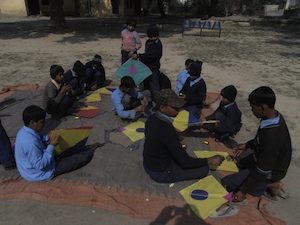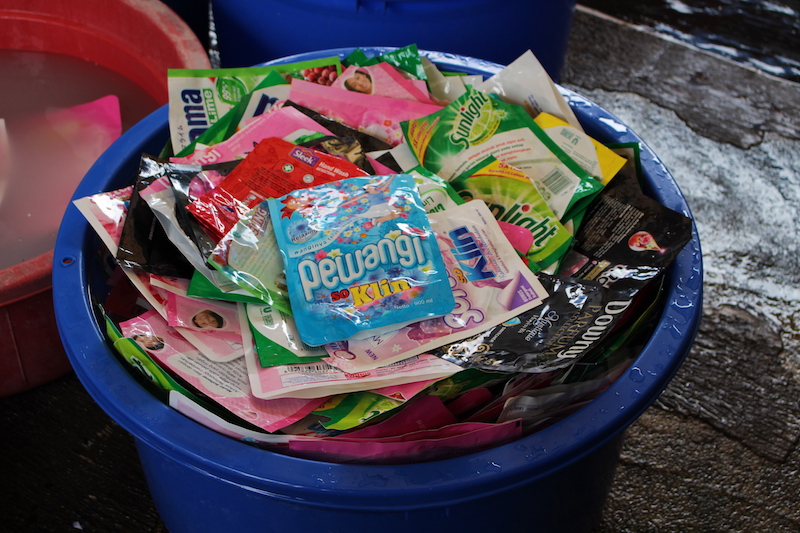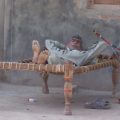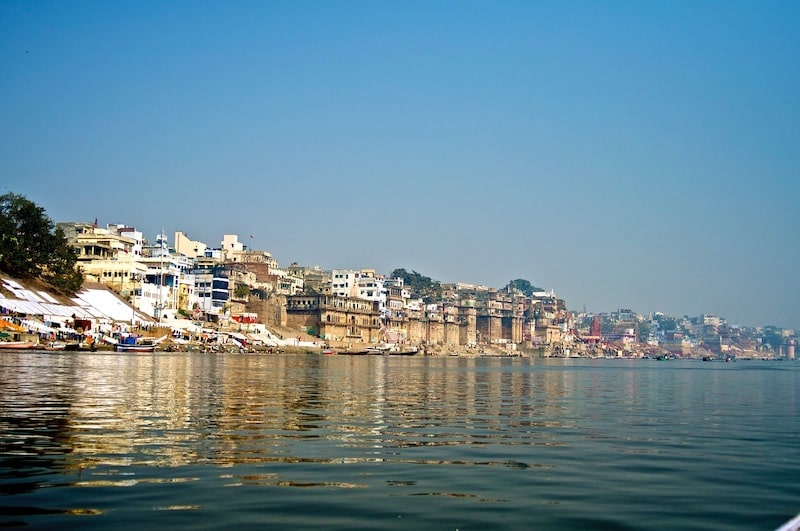
The interview you are about to read was conducted nearly a year ago and today we are happy to share some great news. Thanks to good relations since April 2013, Sylvia Bertoncello’s NGO has been granted permission to take the boys out of the detention center for short visits accompanied by a social worker. Some of the boys have not been out of the center for four or five years. Keep up the good work, Sylvia!
May 2013
Sylvia Bertoncello is a French woman who moved to India with her family and in this interesting interview she tells us about the beautiful projects she is involved with. We invite you to read the article and to visit Sylvia’s website www.jimylibrary.org where you can find information regarding her important work and how you can support her efforts. Should you pass by her corner of world, please do not hesitate to contact Sylvia and she will be happy to tell you about the country that adopted her.
Claudiaexpat
July 2012
What took you to Benares and then to Pondicherry?
We first traveled to India in 1984 because we had adopted a Tibetan child via long distance. We visited Benares where my husband started studying the sitar and since then we have returned each year and have now traveled throughout most of the country.
The Indian culture is so specific and strong with a completely different way of managing life, time and relationships that we felt we needed help in order to familiarize ourselves. Therefore, we conversed with our friends and read a lot in order to have a better understanding of the Indian culture. We also found that numerous encounters and sincere friendships have helped.
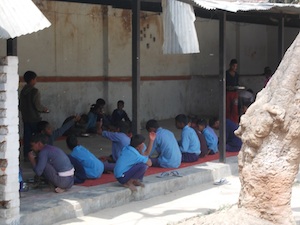 In 2007, we moved to Benares with the intention of living there permanently. Our daughter went to the Indian school until the eighth grade, and then she wanted to continue studying at the French school in Pondicherry. We have been living in Pondicherry since July 2011 and we plan to stay three more years until our daughter graduates.
In 2007, we moved to Benares with the intention of living there permanently. Our daughter went to the Indian school until the eighth grade, and then she wanted to continue studying at the French school in Pondicherry. We have been living in Pondicherry since July 2011 and we plan to stay three more years until our daughter graduates.
When she finishes school, we will move back to Benares which we love so much. In Benares, we have our associations, our Indian and musician friends and a Western friend that lives there the entire year. We’ll certainly settle down in a village close by because, despite loving this city that really has a soul, its development generates problems linked to pollution and high noise.
It is impossible to compare Benares to Pondicherry as they are two completely different worlds and cultures. The climate in the south is less harsh than in the north and Pondicherry is a quite and pleasant place and very clean for a city in India. There is a French Cultural Centre which provides for some activities and the French school, where I teach French as a foreign language, maintains a high level of teaching.
How did you get the idea of setting up the Jimy Library Association and what is its main goal?
The Jimy Library Association was created to honor the memory of an adolescent that loved reading and India. Its purpose is to boost children’s education through the purchase of books, the creation of libraries and to use every pedagogical action that aims to improve education.
The library is very simply organized with members voting on budget decisions and then we put our plans into action according to our finances and the needs we have ascertained.
The secretary and treasurer live in France and perform of all their tasks from there. I go to Benares every two to three months where I receive reports of all the expenditures carried out by our staff at the end of each month. The financial budgets and details are also available on our website.
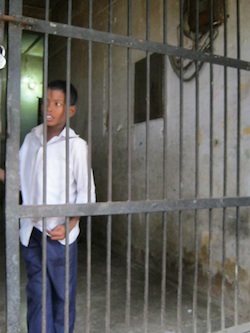 What have been the main difficulties in realizing the project? How is the relationship between the expats and the local Indian population that takes part in the project?
What have been the main difficulties in realizing the project? How is the relationship between the expats and the local Indian population that takes part in the project?
Our first project was the creation of a library of books in Hindi and English. We shipped a container from France with 4,000 books donated by the British, who are numerous in the southwest of France and close to where we used to live. It took the container only three weeks to go from Marseille to Kolkata, but we had to fight for four months with customs in order to get it!
Luckily, this has been the only real difficulty we’ve faced in this country. All of our other projects, including schools for which we buy books and finance courses of kathak, the French library, and the detention center for boys, are fine because in Benares we have a lot of long-time friends that assist us with good advice.
My husband playing the sitar and being involved in the life of the musicians’ families, the fact of loving and deeply knowing the Indian culture and especially understanding Hindi, play in our favor in having good relationships with the general local population.
We have tight relationships with our staff and we participate in their families’ lives. It is important to have a relationship of trust and respect with these people and Indians truly appreciate those who strive to learn their language and love their culture.
Since you help young boys in a prison, do you manage to visit them personally? Tell us a bit more about this aspect of the project.
The Ramnagar prison, near Benares, is a governmental centre that hosts 85 boys from 6 to 18 years of age. They are found while young and in the streets, abandoned by their parents or they have left their families that have abused them and the Indian government must take care of them. Unfortunately, lack of means, motivation and corruption make the situation of these boys tragic. They have not carried out any serious criminal offences but they are caught by the police and must stay in prison until they are 18 or until their parents, or a person that takes legal responsibility for them, are found. In practice this never happens. The young boys stay within the walls, isolated from society, until they turn 18. At that point they are thrown out without any preparation or means whatsoever to start a life and they are completely asocial.
In 2008 some members of the Jimy Library Association visited the detention center. They saw the inhumane day-to-day conditions of these boys and understood the imperative need to help them. Abandoned to themselves or to the violence of the guards, they lived in an alarming state of hygiene and of mental and physical stress and there have been a lot of deaths. We were shocked, shaken and also angry seeing such a thing in our modern times and we decided to do something to improve these boys’ lives. We followed the advice of our friends with the Indian NGO, D-Foundation, and the daily routine of the boys has changed tremendously.
We freely enter the center and we can ask for authorization for anyone who accompanies us. The Indian government trusts us completely and follows our advice and suggestions despite investing very little of their finances. You can follow the exact state of this project on our website: www.jimylibrary.org
The library you have created is useful to students and teachers but also to tourists. What can they find in the library?
At the end of 2008, we created the French library and members of the Jimy Library Association can send parcels of books from France (at a cost of 13 euros for 5 kilos). Volunteer Indian students and professors take care of the books and sell them in the library while young French volunteers often participate, thus creating nice friendships between them and the young Indians.
The book stock is varied and interesting and tourists that travel a lot are very happy to purchase the French books at a very good price. Indian students explain their city and culture to the French passing through and tell them about the association. It is a friendly place that fosters linguistic and cultural exchanges between Indians and French.
How do you support the project from a financial point of view?
At the beginning, like most associations, the members of the Jimy Library were relatives and friends and then through word of mouth, everybody tried to increase the membership. Besides contributing financially, members also organize charity dinners as well as garage and charity sales. We collect stamps for the « Récup ‘timbres » Association, and they are also a financial partner. I spend a lot of time searching for funding but, so far, we have not been very successful.
Any ideas and engagements for the future?
Our credibility is mainly based on our capacity to find long-term funding and this is something we work on everyday. The French library will go on welcoming Indians and French and we will continue buying books for the partner schools.
Thank you for giving us a space to talk about our modest NGO. I encourage you to visit our website to find out more details and we would be very happy to answer any questions you might have regarding visiting or moving to India. We believe that our suggestions would prove to be very useful and invite you to contact us.

